YOUNG IDENTITIES
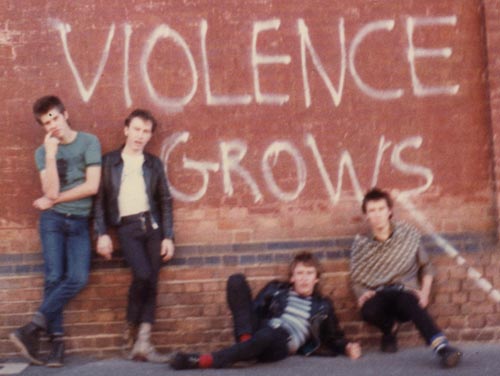
The Young Identities EP's are standouts among the Savage/Shake releases, especially
the New Trends EP. The band's line-up was mixed in with other band Brisbane
bands who were, in turn, part of other groups. In other words, a history of the Young
Identities is necessarily a history of a few other bands. The history below overlaps
and repeats some of what can be found on the Just Urbain
page albeit from a different perspective. I can certainly be counted among the "overseas
overseers" who became interested in the early Brisbane punk scene several years ago.
Without further ado, another history from the younger, snottier contingent of the
no-scene Brisbane scene...
— Ryan Richardson
SHAKEDOWN 1979-83:
How To Become The Local Legends That No-one Remembers!
This is the story of perhaps the most under-funded, under-achieving, no-time
and no-talent label in the history of Australian punk rock. In the space of four
years, the Shake/Savage label released seven vinyl singles and two cassette compilations,
of which they probably sold as many copies each.
Much has been said about how the original punk music of the late seventies motivated
the bored teenagers stranded in the mind numbing suburbs of the Western world, and
this could be no more apparent than Brisbane circa 1977. Here in a city practically
under police curfew, you fucked and fought, got stoned, got married or got out of
town. It was breeding ground — but not for music or different concepts, more
for hatred and intolerance. The "do it yourself" approach was the only way to go,
for as sure as fuck, no one else was going to pull you out of the shit, and so through
this philosophy, Shake Music along with Just Urbain and The Young Identities were
born in all their deformed splendor.
In 1977, Peter Miller from Brisbane's outer Western suburbs was already a minor player
in the city's punk music scene. He worked part-time at Discreet Music, one of only
two local record stores that imported U.K and American music. He edited one of Brisbane's
first fanzines, The Rat, and ran local punk gigs outside the premises of the Darra
Cement Works. He was also trying his hand at managing Brisbane punk legends, The
Leftovers. It's while working at Discreet one Saturday morning that Peter meets
the McLeod brothers (Rod, Gavin and Clayton) from Brisbane's outer Southern suburbs.
They range in age from 13 to 17, print t-shirts and have wild ideas of forming a band.
With similar tastes in music, collaboration is set in place. Peter brings in Robert
Lewis and Dave Holliday and the roller coaster begins. We don't want to keep world
domination waiting.
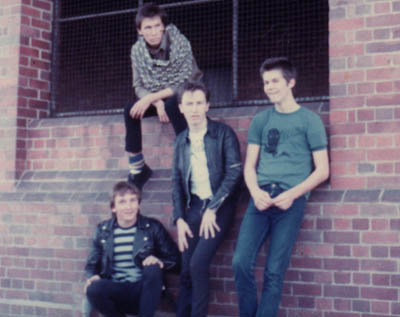 Originally called Silent Noise, Just Urbain were: Peter Miller ~ vocals, Robert Lewis ~
guitar, Rod McLeod ~ guitar, Dave Holliday ~ drums, Gavin McLeod ~ bass.
Originally called Silent Noise, Just Urbain were: Peter Miller ~ vocals, Robert Lewis ~
guitar, Rod McLeod ~ guitar, Dave Holliday ~ drums, Gavin McLeod ~ bass.
This line up doesn't last long after initial rehearsals. Gavin becomes bass player
in the fledgling Young Identities: Clayton McLeod on vocals and Dave Lawless on guitar.
Another Dave, Dave Robinson, later replaces Lawless and Paul Murray is bought in
on drums and here's where the fun begins. No one can play, outside Paul, a maniacal
drummer in the mold of Keith Moon. The only decent piece of equipment is Dave Robinson's
50-watt Marshall. The early practice sessions are more about underage sex and drinking,
and the songs tend to sound like the aforementioned pursuits. Rehearsals are wall-to-wall
teenage fun with no real thought of playing live. A gig is organised at the 1978
Discreet Xmas party but before either band can get near the stage, Brisbane band
The Hard-Ons trash the P.A.
Earlier in the year, Peter and Dave have covered the studio costs for The Leftovers
"Cigarettes and Alcohol" E.P and its all agreed recording is the way to go. We find
the cheapest studio in town and book 8 hours for $300. In that one session, Just
Urbain, The Young Identities and late ring-ins The Bodysnatchers (Rod: guitar/vocals,
Gavin: bass, school friend John Hunter: drums) record and mix the tracks that were
to become the first three Savage Music releases; and doesn't it show! Our engineer
was more likely used to producing radio jingles and voice-overs — not a bunch
of snotty nosed freaks with no idea and too much enthusiasm. The singles are pressed
at EMI custom in Sydney (100: Just Urbain, 300: Young Identities, 300: Bodysnatchers)
and released as Savage Music 001, 002, 003 to worldwide apathy. It didn't seem like
it at the time, but a new local label now existed.
It came as no real surprise when the records didn't sell. No press and no gigs didn't
help. The first gig would come later at the 'Ready Steady Go' dance at Griffith
University supporting The Leftovers. This created a handful of believers, but the
Brisbane scene at this time is famous for its malice and mistrust between bands.
The Savage Music mob were seen as hopeless amateurs, three chord punk thugs, too
young and hopeless to be considered for live work in the city's pathetically undernourished
music scene. So it is left to practice rooms and parties where the bands form their
meager fan base. One such rehearsal session numbered over 40 teenaged fans, which
resulted in some youthful vandalism, which in turn attracted five paddy wagons to
haul our little gang off to the infamous Caxton Street Police Barracks. Phone books
were used but not for their original intention.
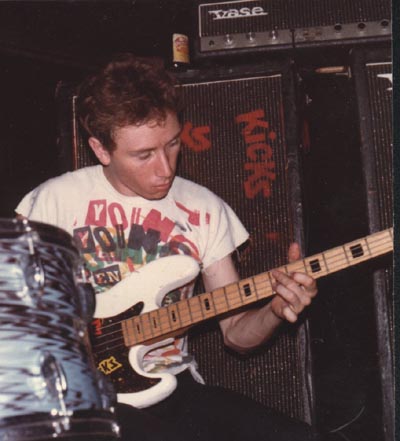 Eventually, gigs do start to happen, though very infrequently. A favoured trick was
showing up for other bands' shows, then through fair means or foul, stealing some
precious stage time. These shows usually end up in smashed gear and drunken stage
invasions by the growing number of pimple faced punters. Just Urbain are viewed as
too weird, too uncontrolled. The Young Identities are seen as too young, too loud.
So it is decided later in 1979, to return to the studios. Just Urbain's 'Hospital Bed'
(004) E.P and The Young Identities 'New Trends' (005) E.P are recorded in Forest Glen
Studios, 80km north of Brisbane at the recommendation of local band The Fun Things.
Dave Robinson has departed The Young Identities and Rod takes over guitar duties.
Our engineer, Mungo Coates, is a lot more encouraging, making the recording process
much more fun. The singles are pressed again at EMI Custom. Covers are hand printed
and limited release of 300 each. The label changes name from Savage Music to Shake
Music but still nobody is buying. The world still hates us and we still hate them.
Eventually, gigs do start to happen, though very infrequently. A favoured trick was
showing up for other bands' shows, then through fair means or foul, stealing some
precious stage time. These shows usually end up in smashed gear and drunken stage
invasions by the growing number of pimple faced punters. Just Urbain are viewed as
too weird, too uncontrolled. The Young Identities are seen as too young, too loud.
So it is decided later in 1979, to return to the studios. Just Urbain's 'Hospital Bed'
(004) E.P and The Young Identities 'New Trends' (005) E.P are recorded in Forest Glen
Studios, 80km north of Brisbane at the recommendation of local band The Fun Things.
Dave Robinson has departed The Young Identities and Rod takes over guitar duties.
Our engineer, Mungo Coates, is a lot more encouraging, making the recording process
much more fun. The singles are pressed again at EMI Custom. Covers are hand printed
and limited release of 300 each. The label changes name from Savage Music to Shake
Music but still nobody is buying. The world still hates us and we still hate them.
The Brisbane scene in 1980 is rapidly stagnating, so we try something different.
Some smart arse buys a guitar tuner — now for that fourth chord! Just Urbain and
The Young Identities go sideways a notch. The Young Identities have such a bad reputation
for being underage, beer-guzzling trouble makers, that they change their name to
Kicks. (The Young Identities last gig is at Fortitude Valley's infamous Pinocchio's.
The ever increasingly psychotic Paul Murray leaves the stage mid-song to relieve
himself, only to be forcibly returned by Clayton and Gavin.) Just Urbain after having
nothing but bemused reactions from audiences decide to leave live work to a minimum
and become studio wankers extraordinaire. The three chord thrash era is nearing its
end for the Young Identities but they still like to play fast and so record two tracks
'Leather' and 'Godzilla' at Multi Media Studios in Spring Hill early 1980. Just Urbain
return to Forest Glen to record 'Goddess' and 'Sounds Like' with new member Wolfgang
Kuepper (brother of Ed) on synth. All four tracks are released later that year as
a combined cassette E.P, in its own fetching hand stitched cloth bag (in McLeod
tartan, of course!) this was Shake Music 006, easy and cheap, limited to a run of
50 and only distributed locally — but it does make its mark. Some people are
starting to take notice.
The gigs for Kicks are still few and far between, but always memorable (stage fights,
fans being thrown into the Brisbane River from a moored container ship, hecklers
set upon by over zealous followers, etc etc) In 1980 a regular gig was established
at a seedy subterranean gay bar called 'The Silver Dollar' in the heart of Brisbane's
Fortitude Valley. Here once or twice a month Kicks crash through a set of originals
along with a handful of Glam rock favourites from their pre-teen years. It is here
that Just Urbain returns for their last ever gig. Facing a hostile bunch of the new
Brisbane punk brigade, the unusual sounds of Just Urbain has the slack jawed audience
not knowing where to look, let alone decipher what they are hearing. The band finish
with a drone and The Silver Dollar shuts its doors three weeks later. Peter and David
head for the UK and put Just Urbain on temporary hold. They would return later to
create a fitting epitaph.
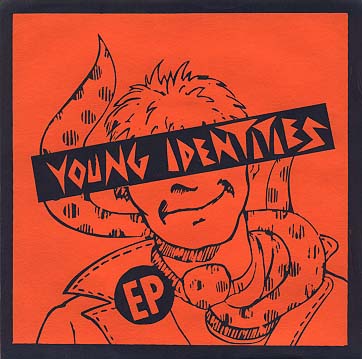 In 1981 an opportunity arises which nobody could refuse. A friend of Rod's has worked
as a caterer for a run down bingo hall above the much-missed Silver Dollar and offers
the area as a weekend venue. Running the place is approached with the same haphazard
bravado as the label. The bingo hall is huge which makes it possible to put on some
of Brisbane's newest unheard bands together with the more established groups from
within the city's Art Rock Mafia. Violence by bouncers at the handful of other clubs
around town made Bingo Pete's a welcome addition to what was passing as Brisbane's
underground music scene.
In 1981 an opportunity arises which nobody could refuse. A friend of Rod's has worked
as a caterer for a run down bingo hall above the much-missed Silver Dollar and offers
the area as a weekend venue. Running the place is approached with the same haphazard
bravado as the label. The bingo hall is huge which makes it possible to put on some
of Brisbane's newest unheard bands together with the more established groups from
within the city's Art Rock Mafia. Violence by bouncers at the handful of other clubs
around town made Bingo Pete's a welcome addition to what was passing as Brisbane's
underground music scene.
The first gig in June features Michael O'Connell (ex-Apartments), Die Tanzen, The
Flying Squad (with original Young Identities guitarist Dave Robinson), The Pits and
Kicks. Having a band run venue with an open liquor licence and lenient entry requirements
finds the place packed on opening night, but in typical fashion nothing goes to plan.
The increasingly erratic Paul Murray has chosen this time for his final freak out —
storming off by the gig. A replacement drummer (Mark Young) is quickly kidnapped
from another band but after only four songs the brothers themselves are trading blows
with most people believing this to be part of the usual mayhem.
Bingo Pete's continues changes name to The Factory for a further three months before
the old blue haired bingo girls could no longer handle the filthy graffiti, smashed
toilets and discarded syringes. The end of another wild adventure with no one to blame
but ourselves and our no-good mates. Even offering to buy off the Valley cops couldn't
save us.
Late 1981 and Kicks record and release their first vinyl since their name change.
By this time most Brisbane bands are either art school fag hags, power pop poseurs
or Detroit dickheads. But the band — forever slaves to their origins — still
stagger around in their leather jackets and Chelsea boots. The whole Brisbane scene
is stagnating so badly it smells. 'Return of the Action Man/The Secret' (Shake 007)
is unleashed with more than a nod to the emerging Goth sound. Goth appealed more
than anything else that was around because of its links to Glam and the fact that
you didn't have to look like some fourth generation Wally who had just discovered
punk rock. Kicks gain quite a following, gaining positive reviews in the street press
but still have to deal with their troublesome reputation on stage. Live shows range
from diabolical supports for interstate pretenders to all-in guest appearances by
anyone who felt like mounting the stage. Now with a second drummer (Matt McGrorie)
joining the band they try something different again. Sounding like a cross between
The Glitter Band and Killing Joke, with regular appearances by Warren Lamond (ex-Leftover),
Kicks stick out like a sore thumb on the lackluster Brisbane groove circuit.
By 1982 several like-minded bands are starting to appear in the shape of The Mystery
of Sixes and Public Execution (whose debut vinyl single was to be produced by Rod).
Another joint cassette single is released as Shake 008 coupling early Public Execution
demos with two Kicks tracks (Kicks theme/Red Blood) from the Action Man sessions.
With a photo copied cover, it is meant for nothing more than friends and only 25
are produced. This becomes the last official recording Kicks will release while
the band existed.
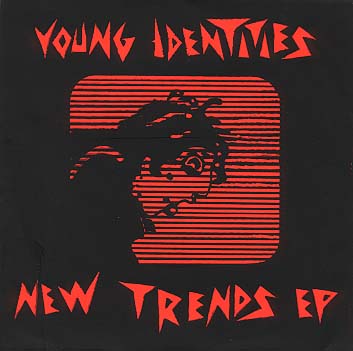 Later in that year Peter and David have returned to Australia and set about recording
The Final Program, the last shake Music single. With Robert Lewis long gone and missing
it practically becomes Just Urbain Mk 1 again with Rod reverting back to guitar and
Gavin in on bass. With this line-up it was once again back to Forest Glen to record
"I'd Rather Stay Home And Watch TV" and "Obsession". Both songs are old Just Urbain
mainstays and were backed with "Goddess" and "Sounds Like" to make the last Shake
Music (009) EP. It seems like a full circle. The record is released in 1983 with
a hand-printed insert and is possibly the rarest of Shake releases.
Later in that year Peter and David have returned to Australia and set about recording
The Final Program, the last shake Music single. With Robert Lewis long gone and missing
it practically becomes Just Urbain Mk 1 again with Rod reverting back to guitar and
Gavin in on bass. With this line-up it was once again back to Forest Glen to record
"I'd Rather Stay Home And Watch TV" and "Obsession". Both songs are old Just Urbain
mainstays and were backed with "Goddess" and "Sounds Like" to make the last Shake
Music (009) EP. It seems like a full circle. The record is released in 1983 with
a hand-printed insert and is possibly the rarest of Shake releases.
For Kicks the end is nigh. The Brisbane scene has become so stale; it is painful
to continue. Still the band returns to the studio one more time with the new two-drummer
line up they record "In Fear of God" and re-record stage favorite "Red Blood". It's
like after all this in cheap studios playing shitty venues the band could find what
buttons work. "God" is later released on Brisbane Punk compilation At the Solicitors
Request LP in 1985. The last ever Kicks gig is the first we were ever offered
by local alternative radio station 4ZZZ. It was a drunken shambles at the National
Hotel in a city that should have been put out of its misery a long ago. It was time
to put the band to bed once and for all. We came, we saw, we pissed off.
And that is basically it. All the bands you have just read about were never fondly
remembered in Brisbane outside of a faithful few. It's been down to a handful of
interstate overseas overseers to look back at this town's musical history to find
and admire what was among the muck. Maybe there was not all that much to appreciate
but for some short time back when nothing mattered some little shits left a mark
in a big shithole!
Dedicated to the memory of Michael Cox.
— Rod McLeod
Mere years after this page was posted, the SHAKEDOWN: Original Brisbane
Punk 1978-83 CD retrospective has been released. The CD includes all
the recorded output by Just Urbain, Young Identities, Kicks, and more!



CONTACT: Break My Face


 Originally called Silent Noise, Just Urbain were: Peter Miller ~ vocals, Robert Lewis ~
guitar, Rod McLeod ~ guitar, Dave Holliday ~ drums, Gavin McLeod ~ bass.
Originally called Silent Noise, Just Urbain were: Peter Miller ~ vocals, Robert Lewis ~
guitar, Rod McLeod ~ guitar, Dave Holliday ~ drums, Gavin McLeod ~ bass. Eventually, gigs do start to happen, though very infrequently. A favoured trick was
showing up for other bands' shows, then through fair means or foul, stealing some
precious stage time. These shows usually end up in smashed gear and drunken stage
invasions by the growing number of pimple faced punters. Just Urbain are viewed as
too weird, too uncontrolled. The Young Identities are seen as too young, too loud.
So it is decided later in 1979, to return to the studios. Just Urbain's 'Hospital Bed'
(004) E.P and The Young Identities 'New Trends' (005) E.P are recorded in Forest Glen
Studios, 80km north of Brisbane at the recommendation of local band The Fun Things.
Dave Robinson has departed The Young Identities and Rod takes over guitar duties.
Our engineer, Mungo Coates, is a lot more encouraging, making the recording process
much more fun. The singles are pressed again at EMI Custom. Covers are hand printed
and limited release of 300 each. The label changes name from Savage Music to Shake
Music but still nobody is buying. The world still hates us and we still hate them.
Eventually, gigs do start to happen, though very infrequently. A favoured trick was
showing up for other bands' shows, then through fair means or foul, stealing some
precious stage time. These shows usually end up in smashed gear and drunken stage
invasions by the growing number of pimple faced punters. Just Urbain are viewed as
too weird, too uncontrolled. The Young Identities are seen as too young, too loud.
So it is decided later in 1979, to return to the studios. Just Urbain's 'Hospital Bed'
(004) E.P and The Young Identities 'New Trends' (005) E.P are recorded in Forest Glen
Studios, 80km north of Brisbane at the recommendation of local band The Fun Things.
Dave Robinson has departed The Young Identities and Rod takes over guitar duties.
Our engineer, Mungo Coates, is a lot more encouraging, making the recording process
much more fun. The singles are pressed again at EMI Custom. Covers are hand printed
and limited release of 300 each. The label changes name from Savage Music to Shake
Music but still nobody is buying. The world still hates us and we still hate them. In 1981 an opportunity arises which nobody could refuse. A friend of Rod's has worked
as a caterer for a run down bingo hall above the much-missed Silver Dollar and offers
the area as a weekend venue. Running the place is approached with the same haphazard
bravado as the label. The bingo hall is huge which makes it possible to put on some
of Brisbane's newest unheard bands together with the more established groups from
within the city's Art Rock Mafia. Violence by bouncers at the handful of other clubs
around town made Bingo Pete's a welcome addition to what was passing as Brisbane's
underground music scene.
In 1981 an opportunity arises which nobody could refuse. A friend of Rod's has worked
as a caterer for a run down bingo hall above the much-missed Silver Dollar and offers
the area as a weekend venue. Running the place is approached with the same haphazard
bravado as the label. The bingo hall is huge which makes it possible to put on some
of Brisbane's newest unheard bands together with the more established groups from
within the city's Art Rock Mafia. Violence by bouncers at the handful of other clubs
around town made Bingo Pete's a welcome addition to what was passing as Brisbane's
underground music scene. Later in that year Peter and David have returned to Australia and set about recording
The Final Program, the last shake Music single. With Robert Lewis long gone and missing
it practically becomes Just Urbain Mk 1 again with Rod reverting back to guitar and
Gavin in on bass. With this line-up it was once again back to Forest Glen to record
"I'd Rather Stay Home And Watch TV" and "Obsession". Both songs are old Just Urbain
mainstays and were backed with "Goddess" and "Sounds Like" to make the last Shake
Music (009) EP. It seems like a full circle. The record is released in 1983 with
a hand-printed insert and is possibly the rarest of Shake releases.
Later in that year Peter and David have returned to Australia and set about recording
The Final Program, the last shake Music single. With Robert Lewis long gone and missing
it practically becomes Just Urbain Mk 1 again with Rod reverting back to guitar and
Gavin in on bass. With this line-up it was once again back to Forest Glen to record
"I'd Rather Stay Home And Watch TV" and "Obsession". Both songs are old Just Urbain
mainstays and were backed with "Goddess" and "Sounds Like" to make the last Shake
Music (009) EP. It seems like a full circle. The record is released in 1983 with
a hand-printed insert and is possibly the rarest of Shake releases.![]()
![]()
![]()